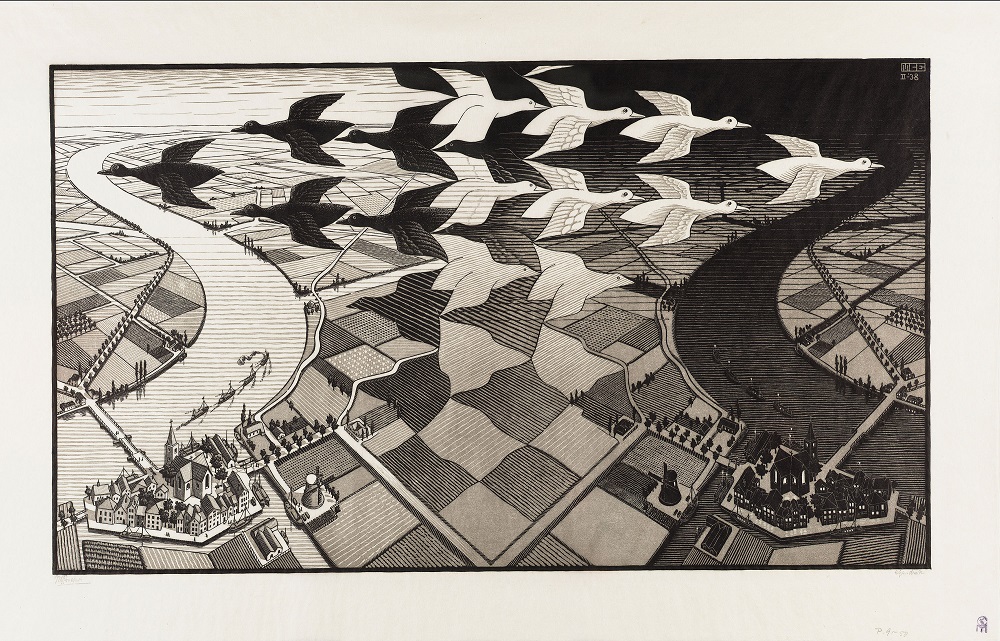
M.C. Escher: Journey to Infinity
2021, NR, 81 min. Directed by Robin Lutz.
REVIEWED By Josh Kupecki, Fri., Feb. 5, 2021
As if it wasn’t already abundantly clear, humanity tends to divide the world through binary systems. Self and other, this not that, grilled or fried, life becomes much easier when reduced to dualism. Those pesky grays of dialectic reasoning are too complicated, anyway. But Dutch artist M.C. Escher wasn’t using his obsession with binaries to say, control the populace of a country by pitting them against each other. Rather, Escher was attempting, in his intricate woodcut “investigations” of day and night, of ascending and descending, of pessimism and optimism, to imagine endlessness within a finite space. Escher’s compositions, with their precision and formal mastery, evoke a feeling of going on forever, binaries mutating back and forth, ultimately arriving at a single geometric embryo. Two become one, one becomes all, ad infinitum.
So, of course he was embraced and appropriated by connoisseurs of hallucinogens in the Sixties counterculture, a proto Op Art elder, which just bewildered Escher, and which is the entry point for Dutch filmmaker Robin Lutz’ playful doc, M.C. Escher: Journey to Infinity. Composed entirely from Escher’s correspondences (voiced by Stephen Fry) and interviews with his family, the requisite biographical timeline inherent in artist docs highlights Escher’s evolution as an artist. His family was wealthy and worked in the physical sciences. An early instructor steered him away from architecture and to printmaking. An extended trip to Tuscany and a revelatory trip to the Alhambra in Spain cemented his interests: mathematical tessellations, geometric motifs, symmetrical divisions of the plane. Escher used recognizable images to systemize these concepts, often infusing his work with irony. The film animates a number of Escher’s creations, smoothly explaining his methodologies. At one point, Escher claims that an animated film would be the next step to further his work, but feared no one would want to watch it. It is a topic he returns to throughout his life, how unsure he is that people understood what he was doing. The pitiless self criticism he grappled with is juxtaposed with a vehement determination (oh, those vexing binaries!). It was a determination to pursue a vision he lamented “could never be realized.” Nevertheless, he persisted. Recognition came late in life, but even as he endured pancreatic cancer (it would claim his life in 1972, at the age of 73), he was rolling the ink out on his woodcuts, making prints for his newfound audience.
“I take comfort in the thought that a man will probably never be able to visualize an idea as strongly as he feels it himself,” Escher wrote. That thought echoes certain sentiments commonly found in late night, substance-enhanced conversations; an attempt to articulate, however esoterically, the spiritual, the cosmic, which inevitably lands upon the concept of infinity. And that is what Escher was able to do, his doubts be damned: Successfully visualize infinity. And that is what Journey to Infinity prompts us to contemplate: that our world is not binary, it is infinite. And so perhaps, are we.
Available as a virtual cinema release.
A note to readers: Bold and uncensored, The Austin Chronicle has been Austin’s independent news source for over 40 years, expressing the community’s political and environmental concerns and supporting its active cultural scene. Now more than ever, we need your support to continue supplying Austin with independent, free press. If real news is important to you, please consider making a donation of $5, $10 or whatever you can afford, to help keep our journalism on stands.
June 28, 2024
Richard Whittaker, June 28, 2024
May 10, 2024
M.C. Escher: Journey to Infinity, Robin Lutz









